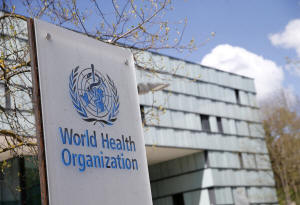At start of WHO talks on pandemic pact, developing countries seek
fairness
 Send a link to a friend
Send a link to a friend
 [December 08, 2022]
By Emma Farge and Jennifer Rigby [December 08, 2022]
By Emma Farge and Jennifer Rigby
GENEVA/LONDON (Reuters) -Developing nations are lobbying for fairer
access to treatments than they got during COVID-19 as global talks begin
on drafting new health rules for combating pandemics.
But they worry that the odds of a favourable outcome from a scheduled 18
months of negotiations at the World Health Organization (WHO) are
already stacked against them, as they lack the negotiating firepower of
wealthier countries.
South Africa, Pakistan and India were among countries that made formal
requests during an initial three days of talks, which ended on
Wednesday, to try to ensure the process is inclusive.
That challenge is "very daunting," said an ambassador from a developing
country who asked not to be named. "The advanced countries have the
requisite resources and can afford to have it covered and we cannot," he
said.
Countries agreed for a six-member body to rework an initial draft with a
view to starting negotiations on that version in February next year, the
WHO said in a statement late on Wednesday.

Then, over a year of tough negotiations on the new document lie ahead,
with a deal targeted by May 2024. One diplomat estimated the talks alone
would take up to 400 hours.
Countries' relative negotiating clout is significant since questions of
fairness - including access to vaccines and drugs and calls for
transparency in governments' dealings with pharmaceutical firms - are
set to be at the heart of talks.
WHO chief Tedros Adhanom Ghebreyesus called the planned accord a chance
to make the world safer for generations, while labelling the
distribution of shots during COVID-19 as "vaccine apartheid".
Dr Jaouad Mahjour, the WHO's Assistant Director-General, Emergency
Preparedness and International Health Regulations, said the health body
had heard small delegations' concerns "very clearly" and would be taking
them into consideration.

[to top of second column]
|

A logo is pictured outside a building of
the World Health Organization (WHO) in Geneva, Switzerland, April 6,
2021. REUTERS/Denis Balibouse
 Three sources familiar with the
negotiations say developing countries are seeking a trade-off built
into the treaty, which would reward them for sharing information
about disease outbreaks with guarantees of access to treatments.
Pressure for a breakthrough on this may increase, they say, with
talks on a temporary waiver of intellectual property rights for
COVID treatments deadlocked at the World Trade Organization.
RESOURCES FOR TALKS
In parallel to the treaty talks, country teams are discussing
setting up a G20 pandemic fund and revamping the WHO's existing
health emergency rules. Experts following the latter will have to
sift through over 20 proposals containing some 300 amendments.
To respond to the challenge, some Western countries like the United
States have appointed a lead negotiator. U.S. representative Pamela
Hamamoto told reporters the current draft accord represented a
"kitchen sink version" and said "a lot" would need to change before
Washington could sign it.
Meanwhile, "small governments will not be able to engage in (the)
process as they will be totally overwhelmed," said Clare Wenham,
associate professor of global health policy at the London School of
Economics and Political Science, who follows the WHO.

Many poorer countries lack technical specialists to advise on WHO
matters within the Geneva diplomatic mission, where the U.N. agency
is based. Instead, diplomats from smaller nations split their time
between health and other topics, like trade.
South Africa's Precious Matsoso, co-chair of the pandemic treaty
talks, told Reuters countries could hire experts to help, or band
together for regional representation.
(Reporting by Emma Farge in Geneva and Jennifer Rigby in
London;Editing by Josephine Mason, John Stonestreet and Frances
Kerry)
[© 2022 Thomson Reuters. All rights
reserved.] This material may not be published,
broadcast, rewritten or redistributed.
Thompson Reuters is solely responsible for this content. |